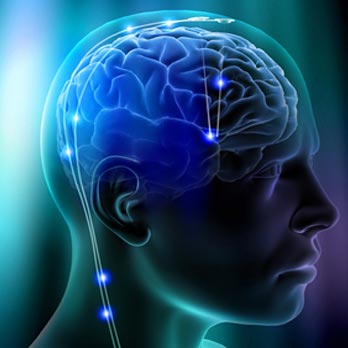 |
|
| UMass Medical School is recruiting patients for a clinical trial to determine whether DBS, a medical technology that delivers electrical pulses into targeted areas of the brain, can relieve depression in those for whom other treatments have failed. Anthony Rothschild leads the study. (Image provided by St. Jude Medical) | |
Depression is a debilitating and sometimes deadly illness for which up to 10 percent of patients do not find relief despite trying some or all of the available treatments. These treatment-resistant patients, numbering in the millions, compel psychiatrists such as Anthony Rothschild, MD, the Irving S. and Betty Brudnick Chair in Psychiatry and professor of psychiatry, to continually search for new options.
Dr. Rothschild is now leading a clinical trial at UMass Medical School and UMass Memorial Medical Center for Deep Brain Stimulation (DBS), a state-of-the-art approach that has shown great promise in previous small studies of patients suffering from treatment-resistant depression. This technique delivers small pulses of current to structures deep within the brain, in an effort to help regulate the brain’s own signals that are not working properly. Already FDA-approved for treatment of Parkinson’s disease, DBS is now being tested in the Brodmann Area 25 Deep Brain Neuromodulation (BROADEN) clinical trial, a controlled, multi-site, double-blind study to evaluate the safety and effectiveness of DBS in patients with treatment-resistant depression.
The study is sponsored by DBS device manufacturer St. Jude Medical, whose Libra Deep Brain Stimulation System provides mild pulses of current from a device implanted near the collarbone and connected to small electrical leads placed at specific targets in the brain. Co-investigator on the study with Rothschild, former UMMS faculty member and neurosurgeon Julie Pilitsis, MD, now at Albany Medical Center, will implant study subjects’ devices in Albany, after which they will be followed in Worcester over several years by Rothschild and Sheldon Benjamin, MD, professor of psychiatry and neurology.
BROADEN is named after its target in the brain, the Brodmann Area 25, a sugar cube-size area of the frontal cortex thought to influence mood. “Imaging studies show that, when people are depressed, the Brodmann Area 25 is overworking. When people get better, regardless of the treatment, the Brodmann Area 25 decreases its activity,” Rothschild explained. “Based on the theory of brain activity in which underactive or overactive circuits in the brain disturb normal function, if the overactive Brodmann Area 25 could be dampened down by an electrode, it might help people with depression.”
DBS device manufacturer St. Jude Medical chose UMass Medical School, one of approximately 20 study centers in North America, as a BROADEN trial site via a highly competitive selection process. “It is exciting that DBS has a scientific rationale supported by imaging studies for why it should work in depression,” said Rothschild. “This study is groundbreaking research, and now it is available to patients in Worcester.”